Should You Use a Travel Trailer Cover? Is It Really Necessary?
Should You Use a Travel Trailer Cover? Is It Really Necessary?
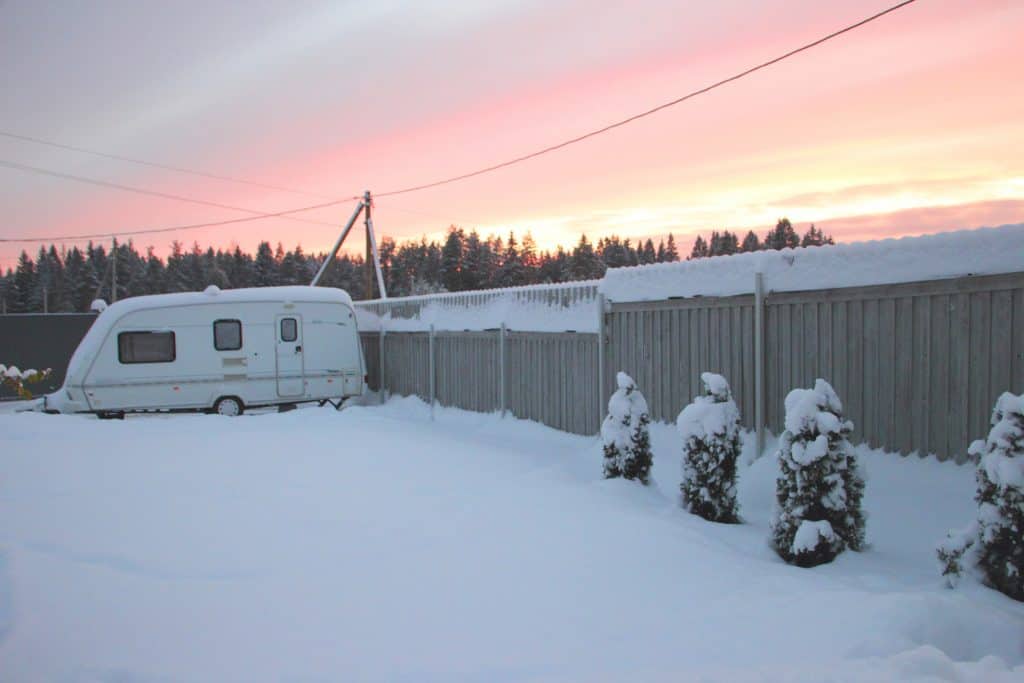
Travel trailers are fantastic companions for anyone who loves camping, road tripping or just traveling anywhere in comfort. But eventually, life usually catches up to you and you need to store your travel buddy away for a few months or even years! When this happens, you might be wondering what you should do to keep your trailer in top condition. But are travel trailer covers really essential to good storage?
Travel trailer covers are important pieces of equipment for any trailer owner to consider. Trailers that are stored without proper protection are vulnerable to UV damage, fading or erosion to the exterior layer, and lowered resale prices.
It’s surprisingly important to properly store your travel trailer when it’s not in use. Little things are easy to overlook, but they can end up costing you a lot in the long run. Travel trailer covers are one of the most important pieces of gear you can have when it comes to maintaining the quality of your trailer.
Dangers of Improper Trailer Storage
On paper, storing a travel trailer seems pretty simple. Just empty out the water tanks, remove all perishable food, lock the doors, and you’re good to go!
But there are actually a lot of hidden dangers and complications to storing a travel trailer. If you’re keeping your trailer outside, there are a lot of things that can damage an exposed vehicle. Any homeowner, farmer, or lost toy can tell you that Mother Nature isn’t kind to anything that’s left outside for too long.
Rain, hail, ice buildup, dust, sandstorms, tree sap, bird droppings, acid rain, and extended UV exposure can all cause lasting damage to an unprotected travel trailer.
Many travel trailers, fifth wheels, and other types of campers are protected by an exterior layer of fiberglass. This is a strong and attractive material that keeps the colors bright and the structure in good shape. But if it’s left out in the open without protection, fiberglass tends to oxidize. This basically means that its color is dulled and it becomes weaker to the elements. And once the fiberglass layer has been weakened, the rest of the hull can quickly follow.
Once this process has started, it can be hard to restore the trailer back to its original state. It’ll cost a lot of money to replace damaged pieces of the hull, and specialists are often needed to do work like this. Plus, this whole process can end up significantly reducing the resale value of your travel trailer. It’s hard to sell a vehicle that has obvious signs of wear and tear, and you won’t be able to get nearly the same amount for a trailer that looks worn down.
Plus, with a faded exterior, your travel trailer is going to lose some of its natural shine and polished look. The first thing that potential buyers will see if the outside of your RV, so it’s important to keep it looking classy. Keep those outer colors looking bright and you’ve got a much easier sale on your hands!
A good travel trailer cover can go a long way toward keeping your trailer in good shape during storage. They’re pretty cheap and will solve a lot of problems before they begin.
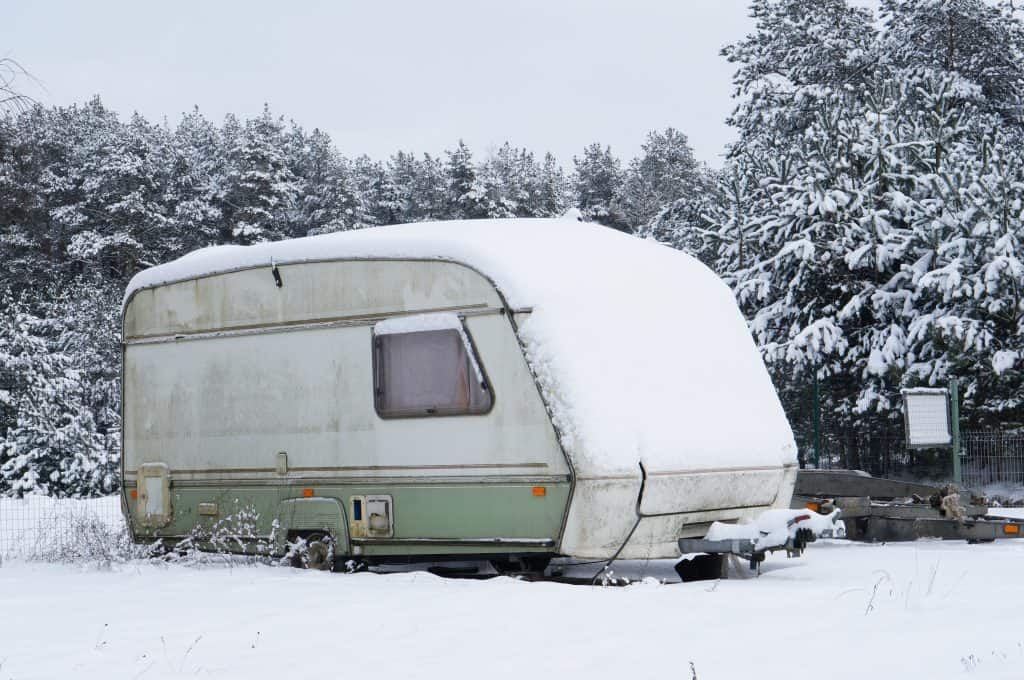
Things to Take into Account Concerning Trailer Covers
So, we’ve answered the first part of the question. Travel trailer covers are important pieces of equipment and can definitely help keep your vehicle protected while it’s not in use.
But how can you choose a good cover for your specific travel trailer? There are a lot of options on the market and it can be hard to know which features are necessary, and which ones are just fancy puff pieces.
The first thing you should look at is the size of your travel trailer. Covers come in a wide range of sizes, so you want to make sure that you buy one that’s the right fit for your vehicle. Make sure that you have accurate measurements of the exterior length, width, and height before you go shopping.
If you have an unusually sized trailer, or just want a more personalized product, you might want to look into custom covers. There are a lot of manufacturers that can sell you covers that are tailored to your individual needs.
Next up is the material and overall design of the covers. Many covers have multiple layers that provide different types of protection. Waterproof layers are obviously a necessity, but other comes with options like thermal insulation and zippered sections that can open independently.
When it comes to things like this, you’ll need to think about what you need the cover for as well as the climate of your area. If you’ll frequently need to get into your stored trailer, covers with optional openings might be a good choice. Likewise, if you live in particularly cold areas, an insulated covering will help protect your trailer from the harsh weather.
You can always pay for covers that are particularly cheap or expensive, but what you need will usually lie somewhere in the middle. Very cheap covers usually won’t provide the protection that your trailer requires, while very expensive covers usually go overboard with their options and luxury materials.
Trailer covers that are manufacturers by well known and trustworthy brands are always your best bet. You might find an option that seems nice and cheap, but you need to be careful when you deal with these. They might not be built to last in the same way that other covers are and you could end up losing more money than you expected.
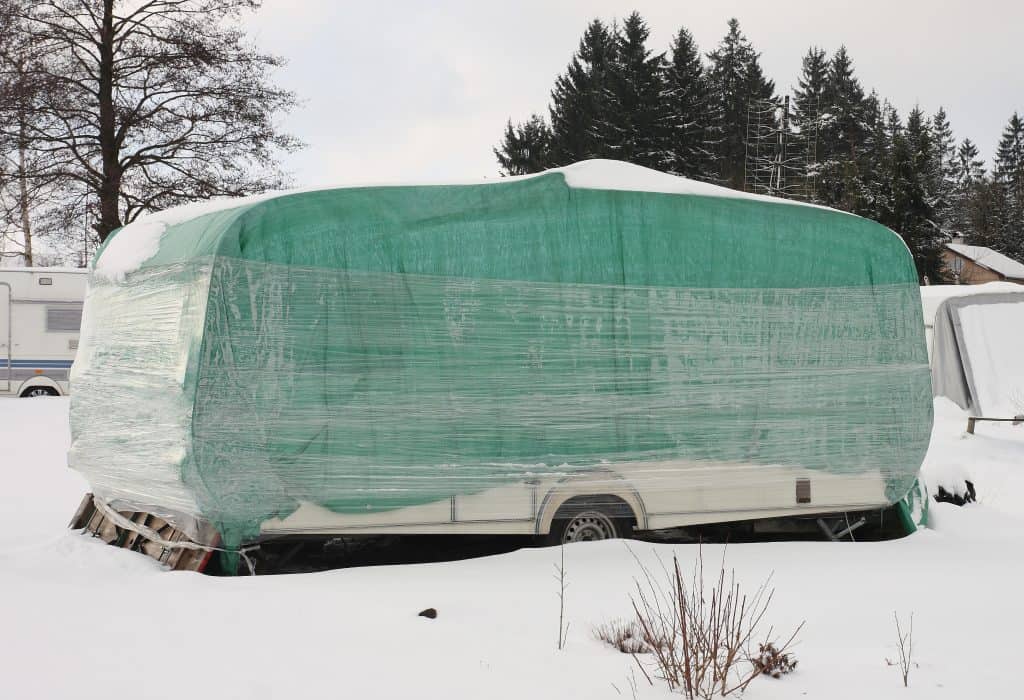
Popular and Effective Travel Trailer Covers
As I mentioned earlier, there are a lot of choices for you to explore when you’re in the market for a travel trailer cover. It can be hard to find brands that you like or covers that will fit your vehicle.
To help point you in the right direction, I’ve collected the information of a few covers that have served their customers quite well over the years. Obviously you need to make sure that these covers will be good matches for your needs and the size of your trailer, but they’re a good place to start!
Each of these come highly recommended and are ranked in order of price. Check them out and see if they seem like good fits for you.
AmazonBasics Trailer RV Cover 30-33 Foot
This cover comes with extra thick layers across the roof to provide maximum protection from rain, snow, and hail damage. The top section is layered with 3-ply material while the sides are protected with thinner, more breathable material.
It also comes with front and rear panels that can be adjusted to tighten or loosen the cover according to the user’s needs. This elasticity helps the entire cover to fit the trailer better and provide the best seal of protection possible.
For more information on this product, including customer reviews, additional pricing information, and photo galleries, visit the product on Amazon here.
Leader Accessories Travel Trailer RV Cover 27-30 Foot L102 W104 H
This trailer cover comes from a wide family of products that are designed to fit nearly any length of travel trailer. This particular unit is designed for the 27 to 30-foot range, but other covers in this family range from 14 to 38 feet of coverage!
This trailer cover has a triple-ply roof covering and single-ply side covering to maximize the flow of moisture. With these breathable sides, mildew and mold won’t build up while it’s being stored. It also has adjustable panels to tighten or loosen the fit and zippered panels that allow easy access to doors and windows.
For more information on this product, including customer reviews, additional pricing information, and photo galleries, visit the product on Amazon here.
RVMasking 5-Ply Top TRavel Trailer RV Cover 22-24 Foot
This cover is one of the finest on the market and is designed to significantly increase your trailer’s outdoor lifespan. It has a 5-ply layer of protection along the top and 3-ply layers covering the sides. Each of these layers provides a different type of protection and will keep your trailer safe from pretty much anything.
This also has a system of waterproof straps and buckles along the bottom which, when coupled with the elastic hem and adjustable tension panels, help create a windproof seal that won’t billow or flap at all.
For more information on this product, including customer reviews, additional pricing information, and photo galleries, visit the product on Amazon here.
Should You Use a Travel Trailer Cover? Is It Really Necessary?

Travel trailers are fantastic companions for anyone who loves camping, road tripping or just traveling anywhere in comfort. But eventually, life usually catches up to you and you need to store your travel buddy away for a few months or even years! When this happens, you might be wondering what you should do to keep your trailer in top condition. But are travel trailer covers really essential to good storage?
Travel trailer covers are important pieces of equipment for any trailer owner to consider. Trailers that are stored without proper protection are vulnerable to UV damage, fading or erosion to the exterior layer, and lowered resale prices.
It’s surprisingly important to properly store your travel trailer when it’s not in use. Little things are easy to overlook, but they can end up costing you a lot in the long run. Travel trailer covers are one of the most important pieces of gear you can have when it comes to maintaining the quality of your trailer.
Dangers of Improper Trailer Storage
On paper, storing a travel trailer seems pretty simple. Just empty out the water tanks, remove all perishable food, lock the doors, and you’re good to go!
But there are actually a lot of hidden dangers and complications to storing a travel trailer. If you’re keeping your trailer outside, there are a lot of things that can damage an exposed vehicle. Any homeowner, farmer, or lost toy can tell you that Mother Nature isn’t kind to anything that’s left outside for too long.
Rain, hail, ice buildup, dust, sandstorms, tree sap, bird droppings, acid rain, and extended UV exposure can all cause lasting damage to an unprotected travel trailer.
Many travel trailers, fifth wheels, and other types of campers are protected by an exterior layer of fiberglass. This is a strong and attractive material that keeps the colors bright and the structure in good shape. But if it’s left out in the open without protection, fiberglass tends to oxidize. This basically means that its color is dulled and it becomes weaker to the elements. And once the fiberglass layer has been weakened, the rest of the hull can quickly follow.
Once this process has started, it can be hard to restore the trailer back to its original state. It’ll cost a lot of money to replace damaged pieces of the hull, and specialists are often needed to do work like this. Plus, this whole process can end up significantly reducing the resale value of your travel trailer. It’s hard to sell a vehicle that has obvious signs of wear and tear, and you won’t be able to get nearly the same amount for a trailer that looks worn down.
Plus, with a faded exterior, your travel trailer is going to lose some of its natural shine and polished look. The first thing that potential buyers will see if the outside of your RV, so it’s important to keep it looking classy. Keep those outer colors looking bright and you’ve got a much easier sale on your hands!
A good travel trailer cover can go a long way toward keeping your trailer in good shape during storage. They’re pretty cheap and will solve a lot of problems before they begin.

Things to Take into Account Concerning Trailer Covers
So, we’ve answered the first part of the question. Travel trailer covers are important pieces of equipment and can definitely help keep your vehicle protected while it’s not in use.
But how can you choose a good cover for your specific travel trailer? There are a lot of options on the market and it can be hard to know which features are necessary, and which ones are just fancy puff pieces.
The first thing you should look at is the size of your travel trailer. Covers come in a wide range of sizes, so you want to make sure that you buy one that’s the right fit for your vehicle. Make sure that you have accurate measurements of the exterior length, width, and height before you go shopping.
If you have an unusually sized trailer, or just want a more personalized product, you might want to look into custom covers. There are a lot of manufacturers that can sell you covers that are tailored to your individual needs.
Next up is the material and overall design of the covers. Many covers have multiple layers that provide different types of protection. Waterproof layers are obviously a necessity, but other comes with options like thermal insulation and zippered sections that can open independently.
When it comes to things like this, you’ll need to think about what you need the cover for as well as the climate of your area. If you’ll frequently need to get into your stored trailer, covers with optional openings might be a good choice. Likewise, if you live in particularly cold areas, an insulated covering will help protect your trailer from the harsh weather.
You can always pay for covers that are particularly cheap or expensive, but what you need will usually lie somewhere in the middle. Very cheap covers usually won’t provide the protection that your trailer requires, while very expensive covers usually go overboard with their options and luxury materials.
Trailer covers that are manufacturers by well known and trustworthy brands are always your best bet. You might find an option that seems nice and cheap, but you need to be careful when you deal with these. They might not be built to last in the same way that other covers are and you could end up losing more money than you expected.

Popular and Effective Travel Trailer Covers
As I mentioned earlier, there are a lot of choices for you to explore when you’re in the market for a travel trailer cover. It can be hard to find brands that you like or covers that will fit your vehicle.
To help point you in the right direction, I’ve collected the information of a few covers that have served their customers quite well over the years. Obviously you need to make sure that these covers will be good matches for your needs and the size of your trailer, but they’re a good place to start!
Each of these come highly recommended and are ranked in order of price. Check them out and see if they seem like good fits for you.
AmazonBasics Trailer RV Cover 30-33 Foot
This cover comes with extra thick layers across the roof to provide maximum protection from rain, snow, and hail damage. The top section is layered with 3-ply material while the sides are protected with thinner, more breathable material.
It also comes with front and rear panels that can be adjusted to tighten or loosen the cover according to the user’s needs. This elasticity helps the entire cover to fit the trailer better and provide the best seal of protection possible.
For more information on this product, including customer reviews, additional pricing information, and photo galleries, visit the product on Amazon here.
Leader Accessories Travel Trailer RV Cover 27-30 Foot L102 W104 H
This trailer cover comes from a wide family of products that are designed to fit nearly any length of travel trailer. This particular unit is designed for the 27 to 30-foot range, but other covers in this family range from 14 to 38 feet of coverage!
This trailer cover has a triple-ply roof covering and single-ply side covering to maximize the flow of moisture. With these breathable sides, mildew and mold won’t build up while it’s being stored. It also has adjustable panels to tighten or loosen the fit and zippered panels that allow easy access to doors and windows.
For more information on this product, including customer reviews, additional pricing information, and photo galleries, visit the product on Amazon here.
RVMasking 5-Ply Top TRavel Trailer RV Cover 22-24 Foot
This cover is one of the finest on the market and is designed to significantly increase your trailer’s outdoor lifespan. It has a 5-ply layer of protection along the top and 3-ply layers covering the sides. Each of these layers provides a different type of protection and will keep your trailer safe from pretty much anything.
This also has a system of waterproof straps and buckles along the bottom which, when coupled with the elastic hem and adjustable tension panels, help create a windproof seal that won’t billow or flap at all.
For more information on this product, including customer reviews, additional pricing information, and photo galleries, visit the product on Amazon here.
The Pros and Cons of RV Covers

We live full-time in our RV and we have for about 18 years now, so RV covers haven’t been on our list of things to research. But as we’ve been thinking of our fellow RVers who are preparing to store their rigs for the winter, a question arose about covering RVs that don’t have the opportunity to hibernate at an indoor storage facility. So, today we’re investigating the pros and cons of RV covers.
Let’s get right to it!
- 1) What is an RV Cover?
- 2) Is Covering Your RV a Good Idea?
- 3) What Are the Pros of Using an RV Cover?
- 4) What Are the Cons of Using an RV Cover?
- 5) Should You Cover Your RV in Winter?
- 6) Should You Cover Your RV with a Tarp?
- 7) Pros and Cons of RV Covers at a Glance
What is an RV Cover?
RV covers were made for RV owners who don’t have a place to store their under a solid roof when not in use but who want to protect them from the elements. RV covers offer protection that doesn’t require a large garage or the cost of a storage facility.
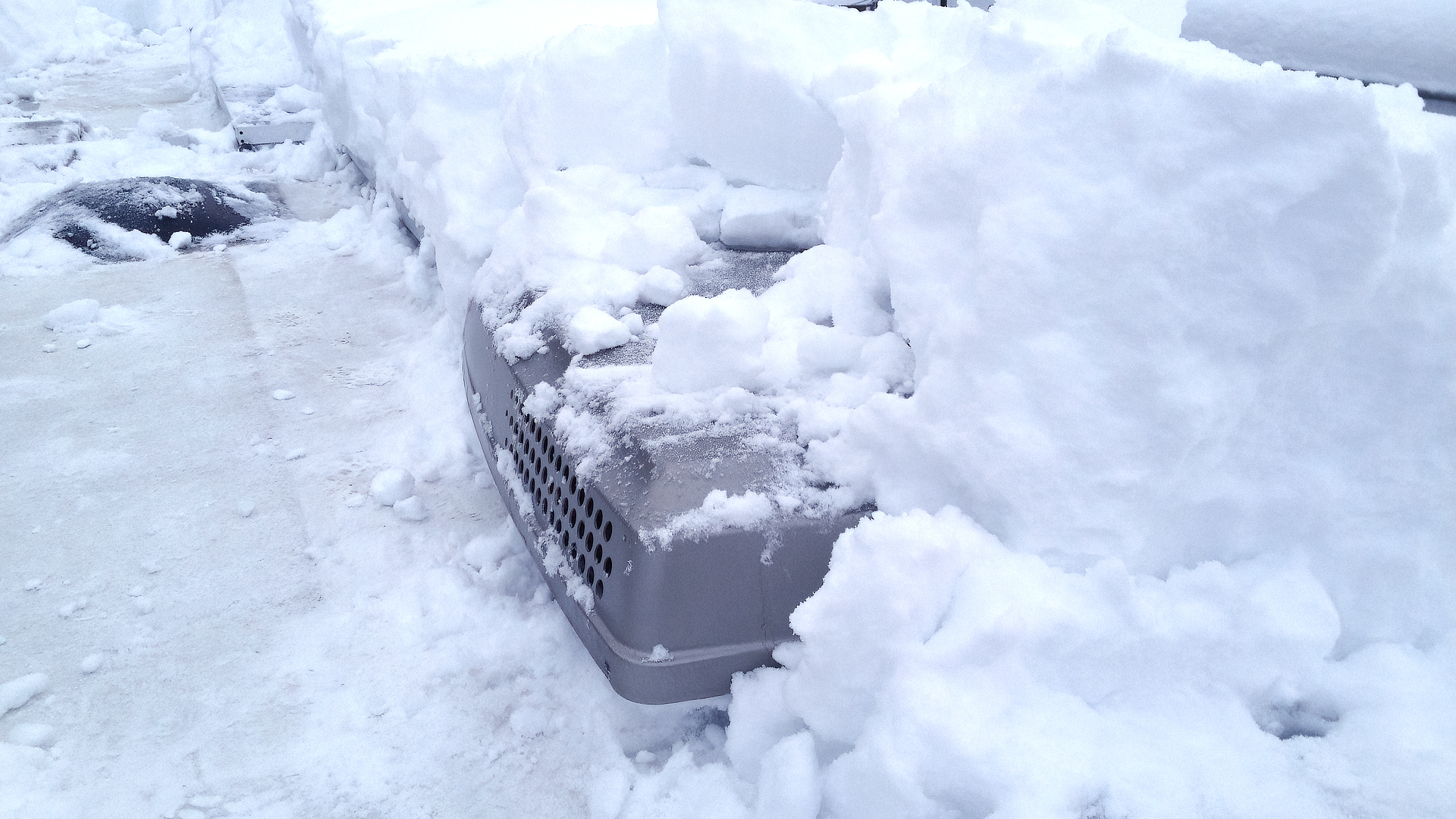
RV rooftop appliances, such as our rooftop AC unit shown here, are protected from the elements when an appropriate RV cover is used.
Made of strong, durable, water-resistant fabric (such as polypropylene or polyester), RV covers protect the paint and finish of the RV as well as windows and rooftop appliances (such as air conditioners and vent fans) from UV rays, rain, snow, ice, hail and even debris like small tree branches.
Is Covering Your RV a Good Idea?
The answer to this question depends on what you’re using to cover your RV. Covering your RV is a good idea if you’re using a high-quality cover made of breathable material (like polypropylene or polyester), particularly one that has vents that allow a bit of airflow under the cover, and a water-resistant coating.
In order to prevent mold and mildew (both to your RV and to the cover itself), a high-quality cover is designed to allow trapped moisture to evaporate and is also designed for the cover to dry quickly and completely. So, breathable cover materials and vents allow moisture to escape, thus prohibiting the growth of mold and mildew which can cause damage to your RV and the cover.
In addition, vents can be helpful in strong wind conditions that might otherwise cause a fair amount of stress to the fabric and tie-down straps.
What is NOT good to do is to cover your RV with something that isn’t specifically designed for this purpose.
What Are the Pros of Using an RV Cover?
There are pros and cons of RV covers, but the benefits can surely outweigh the disadvantages, providing you’re using a high-quality RV cover.
Whether you’re storing your RV in a cold winter climate or in a warmer location, protection from UV rays is a benefit of a high-quality RV cover. The sun can damage seals, fade decals, and even degrade your RV’s paint.
Keeping moisture off of (and thus out of) your RV is another important factor in the “pro” category of the “pros and cons of RV covers”. Moisture and leaks are enemies of every RV, and anything that adequately protects your RV from potential water damage is a clear benefit.
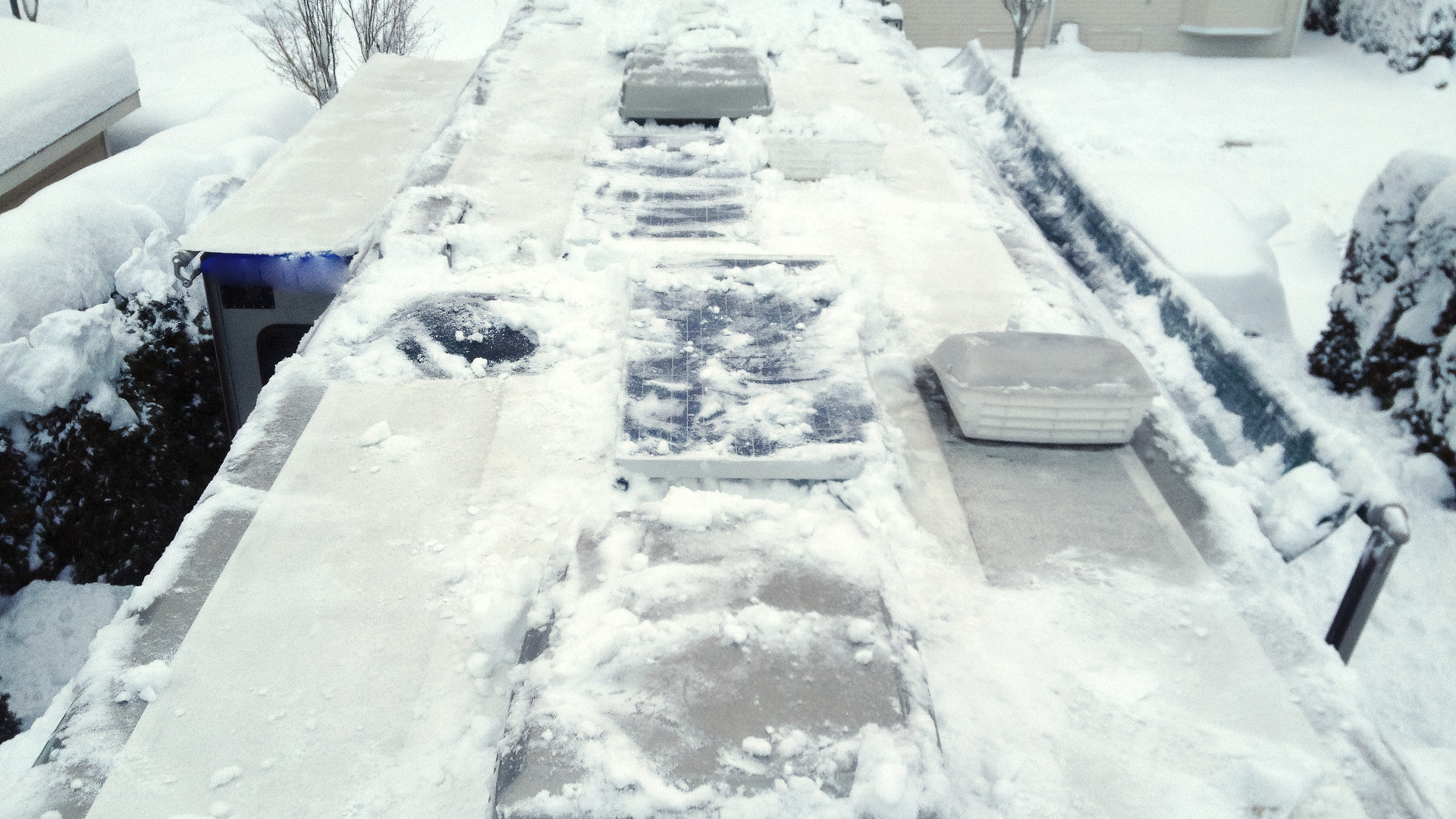
If your RV is stored in areas that are prone to snowy conditions, an RV cover can be helpful, as long as it’s a high quality cover designed for this purpose. With or without a cover, you’ll need to keep heavy snow from accumulating on your RV’s roof!
General protection from every type of weather is another advantage of RV covers. Whether the area where your RV sits sees lots of sun, rain, snow, ice, or wind, a high-quality RV cover will offer a degree of protection that an uncovered RV wouldn’t receive.
And finally, an RV that remains outside in any season and in any type of weather will require a serious wash and a wax job at the very least, or an expensive detailing job depending on where (and how long) it’s sitting while it’s not in use. A good RV cover (properly installed) will protect your rig from dirt, debris, small tree branches, sap/pitch from trees, and the ire of defecating birds.
What Are the Cons of Using an RV Cover?
On the “cons” side of the equation, in windy conditions (especially in areas that are consistently windy), the blowing and rubbing of the material against the finish of an RV for months at a time can cause the finish to dull or even to sustain small scratches or worse. If storing your RV in conditions like this, be sure to regularly check that the cover is properly tied down and not unduly flapping/chafing due to the wind.
Also, if your RV cover isn’t made of the appropriate material, or if it doesn’t fit correctly or is poorly attached and secured, airflow can be too great or insufficient, and that could result in the breeding of mold and/or mildew.
As well, generators and engines need to be run periodically (even when stored!) and, depending on the type of RV you have & the type of RV cover you’re using, running the engine and/or the generator might be difficult without removing the cover. In this case, you’ll either be highly inconvenienced by the need to remove the cover periodically, or you’ll choose not to exercise your generator or engine. Depending on how long a period of time your RV remains covered and unused, this could be a problem.
Should You Cover Your RV in Winter?
If you don’t intend to use your RV in winter, covering it is a good idea as long as you cover it properly, using a high-quality cover that fits your RV appropriately.
And again, if you’re able to exercise your generator and your RV’s engine periodically, and if you’re able to enter your RV occasionally to check for unwanted guests of the rodent variety, covering your RV in winter should work well for you.
Bear in mind that if you live in high-snow areas, allowing a lot of snow to sit on your RV all winter is not a good idea. First, the weight of the snow itself can do damage to the various covers and components on your roof, or even the roof itself! Second, snow melt can pool up underneath the snow and find ways into your RV that it normally wouldn’t, doing unseen damage that could haunt you for years to come.
So it’s a good idea to remove snow as it occurs in order to prevent a significant accumulation of heavy snow and ice.
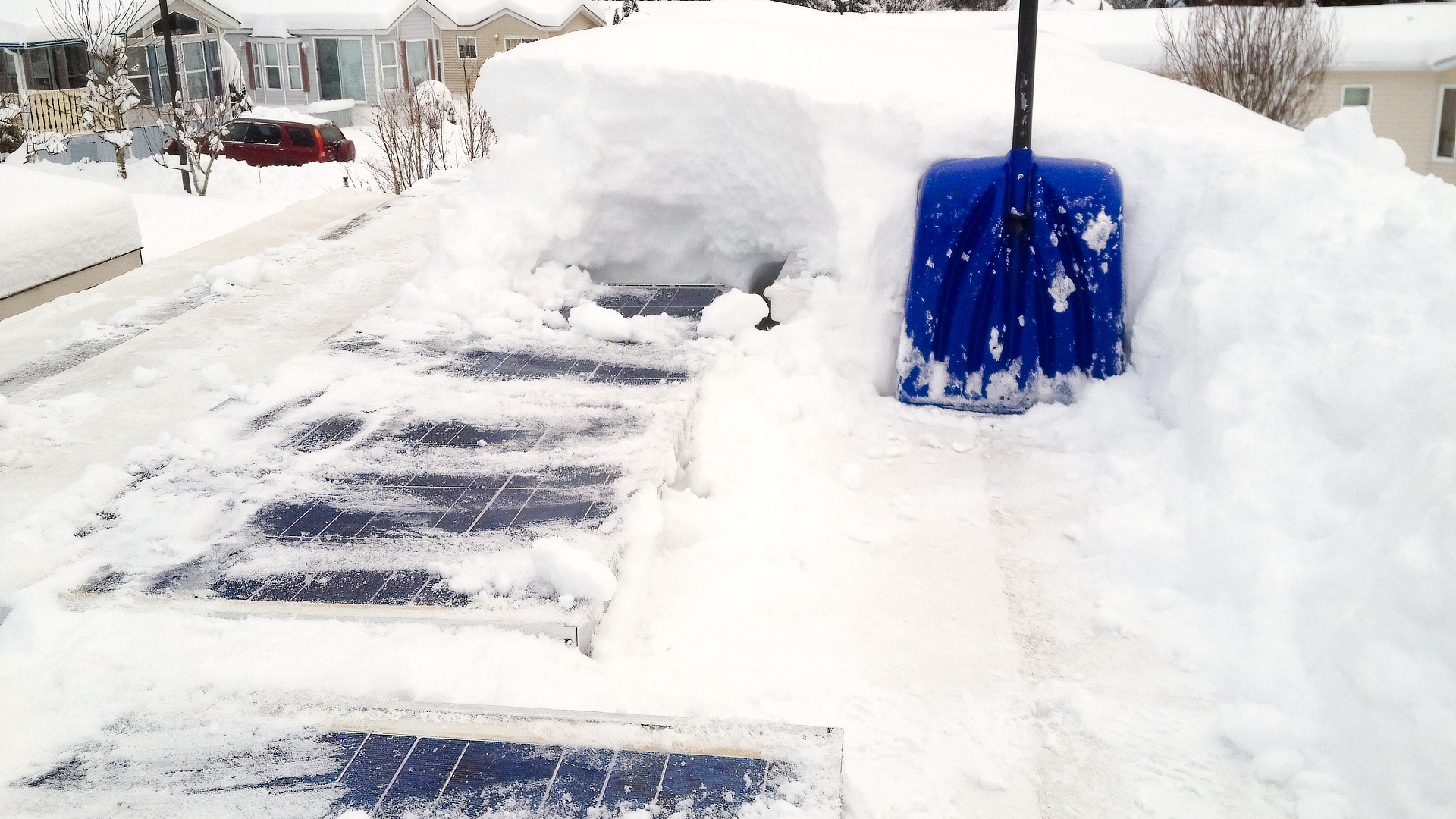
Here you see our RV after a snowstorm that brought a very significant accumulation of snow to our rooftop. RV cover or not, heavy snow must be removed from the roof of your RV. Here we had to use extreme caution as an uncovered, snowy RV roof is extraordinarily slippery.
Should You Cover Your RV with a Tarp?
No. Never. Not in any universe should you ever cover your RV with a tarp for an extended period of time. Tarps are not constructed of breathable material, which is why covering anything with a tarp for a long period of time is a sure-fire way to find mold and mildew breeding when you remove it.
If you’re going to cover your RV at all, try to locate a well-made RV cover that will offer protection to your rig rather than making it more vulnerable than keeping it uncovered would.
Pros and Cons of RV Covers at a Glance
An RV is a significant investment and certainly worthy of as much protection as we can offer. When your RV won’t be in use for an extended period of time, if you’re unable to store it under a roof either at your home or at a storage facility (which can be quite expensive), a good RV cover may be well worth owning.
It’s obviously important, however, to make sure that the cover is not only of high quality but also adequately secured so that no damage will come to the RV as a result of being covered.
If a high-quality RV cover is not affordable or obtainable at this time, your RV might be best left uncovered, with close monitoring and good care and maintenance throughout the period of unuse.
Geek Out with Us Every Week
Join our newsletter to learn about all things RV-related. Every week we offer free tips, tricks, product reviews, and more to our online community of RVers. So, whether this is your first time on the road or you’re a seasoned expert, we’d love for you to geek out with us!
Source https://camperreport.com/should-you-use-a-travel-trailer-cover-is-it-really-necessary/
Source https://camperreport.com/should-you-use-a-travel-trailer-cover-is-it-really-necessary/
Source https://www.thervgeeks.com/pros-and-cons-of-rv-covers/